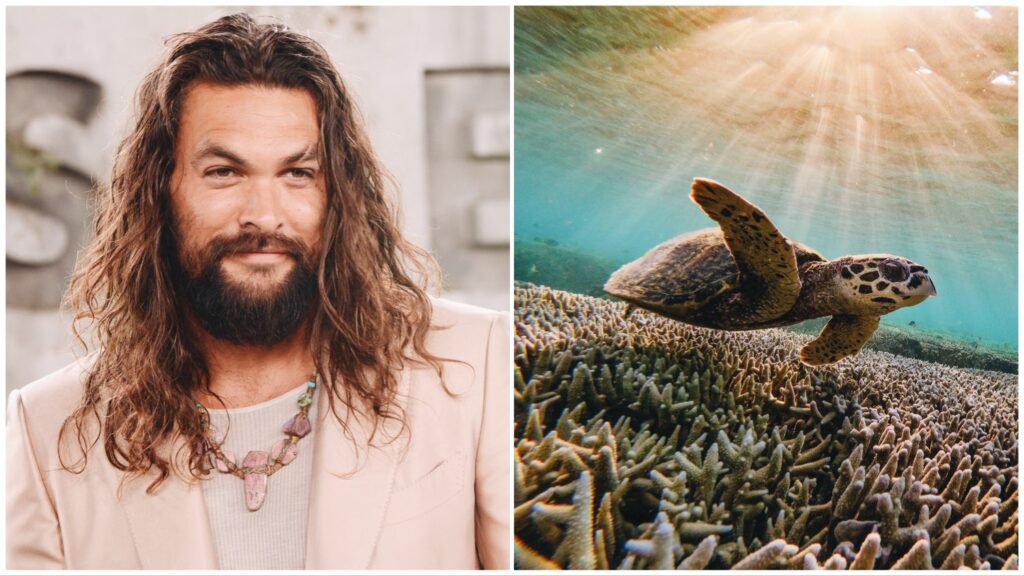Jason Momoa and Joanna Lumley are two of the latest media personalities and environmentalists to back the labeling of Australia’s Great Barrier Reef as endangered.
Momoa and Lumley—both actors and advocates for a wide variety of causes—join journalists and explorers Philippe and Ashlan Gorse Cousteau, Mission Blue president Sylvia Earle, filmmaker Adrian Grenier, the Prince of Monaco HSH Prince Albert II, and several other notable public figures in calling for the recognition of climate change’s effect on the one-of-a-kind reef.
Later on this week, the World Heritage Committee will decide whether to place the world-famous reef system on its endangered list following instances of mass coral bleaching. Endangered classification will mean additional protection measures to ensure the continued survival of the Great Barrier Reef.
“The climate emergency is already evident in the Great Barrier Reef,” say the signatories, in a statement published by the Australian Marine Conservation Society. “Over the past five years, three severe coral bleaching events fuelled by global warming have caused mass coral mortality.”
Australia’s leading environmental NGOs have also written an open letter to the World Heritage Committee backing the “in danger” listing for the Great Barrier Reef.
Is Jason Momoa an Environmentalist?
For Lumley and Momoa, their advocacy for the Great Barrier Reef is nothing new.
Lumley, best known for her role as Patsy Stone in Absolutely Fabulous (1992-2012), regularly advocates for both human and animal rights, as well as environmental causes such as wildflower meadow planting facilitated by British charity the Earth Restoration Service.
Momoa, the Hollywood star of Aquaman (2018) and Dune (2021) has previously spoken out about the importance of recycling and remains actively involved in Hawaiian protests against the Thirty Meter Telescope’s construction on Mauna Kea, sacred native land.
Back in 2019, Momoa launched his own tinned water company called Manalalu (“Mana” meaning the sacred spirit of life, and “Nalu” meaning a powerful wave) to cut back on single-use plastics. He spoke to the UN the same year to discuss ocean pollution and water inequality and was critical of human-caused pollution.
In February, Momoa also launched a limited-edition vegan shoe collection that combines biodegradable outsoles with algae-based insoles, helping to clean up and protect both terrestrial and marine environments by removing toxic algae blooms and using them to replace high-impact sneaker materials.
Is the Great Barrier Reef Really Endangered?
According to WWF Australia, global warming has bleached much of the Great Barrier Reef bare, with a total loss of at least 50 percent coral cover. Human-caused pollution has significantly impacted the surrounding marine ecosystem, and continuing coastal development threatens it further.
“The scientific evidence is beyond doubt: the Great Barrier Reef is in danger and it is time to act,” say the signatories. “We therefore support UNESCO’s recommendation to the World Heritage Committee to inscribe the Great Barrier Reef on the List of World Heritage in Danger.”
UNESCO made the initial recommendation earlier this month. But Prime Minister Scott Morrison’s government is leading an intensive lobbying campaign to block the categorization, arguing that political rather than scientific reasons led to the decision.
Contrary to what the government says, the Australian reef authority itself downgraded the reef’s status in 2019 from “poor” to “very poor” following a lack of meaningful nationwide action. Furthermore, the government has been roundly criticized for its continued investment in fossil fuel infrastructure despite the increasing global impact of climate change. Notably, oil-rich countries Saudi Arabia and Bahrain back the government’s UNESCO lobbying effort.
“The recommendation from UNESCO is clear and unequivocal that the Australian government is not doing enough to protect our greatest natural asset, especially on climate change,” said Richard Leck, Head of Oceans for the World Wide Fund for Nature-Australia, as reported by the BBC.
“There is still time to save the Great Barrier Reef, but Australia and the world must act now,” say Lumley, Momoa, and the other signatories. “We commend UNESCO for its leadership. We urge the World Heritage Committee to endorse UNESCO’s recommendation.”


